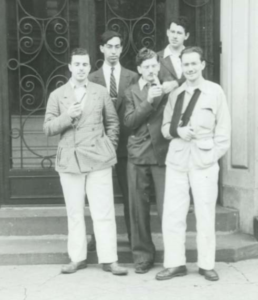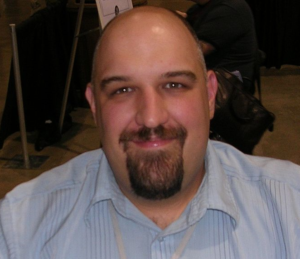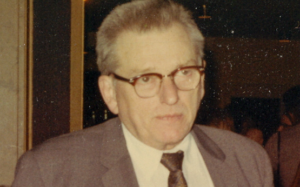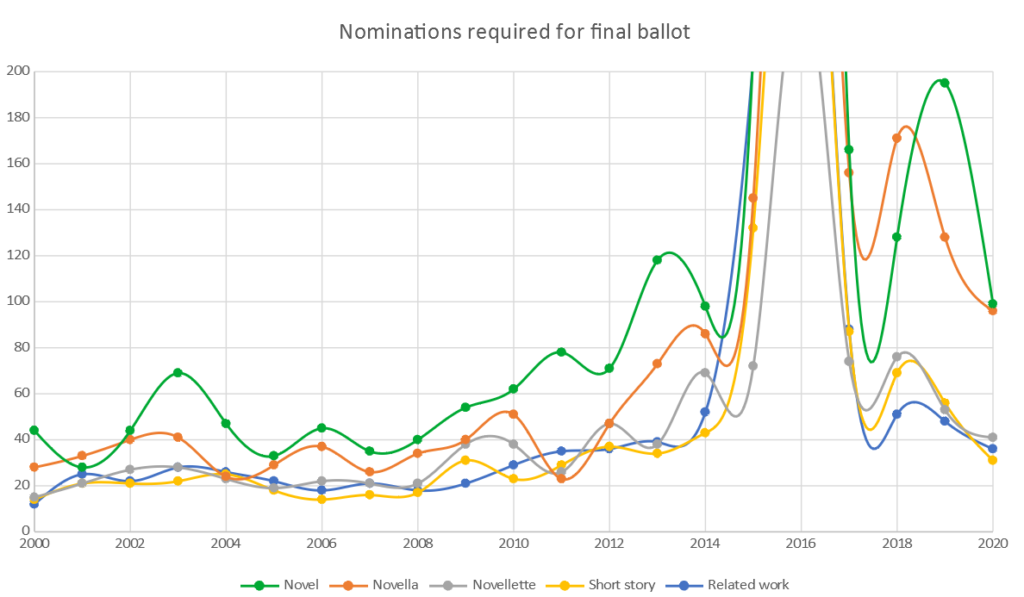One of the oldest large gathering of science fiction-fans was the 1939 “Worldcon” in New York. A conflict between local New York fan clubs made the committee ban several fans, among them Frederik Poul. Since then, there have been many other conflicts in “fandom” – at that time only US fandom, but later Worldcon-going fandom became more international.

In 1939 the “Futurians” who were banned (or at least one of them Dave Kyle, who somehow manged not to get banned) were sad because they had no influence on the planning of the cenvention, even though its name implied that it was for not only all US fans, but for fans from all over the World.
More than 50 years later, Larry Correia, a writer of militry sf and fantasy, also felt that the “World”-con was not for him. The science fiction he liked and wrote was considered trash by most of the other fans at a Worldcon he attended because one of his books were nominated for the Hugo Award. He decided to start a campaign for promoting his kind of science fiction among the Worldcon fandom. Like Dave Kyle did in 1939 for a more “democratic” convention.
Dave Kyle’s stack of anonymous pamphlets were discovered by the committee, and that was the end of that rebellion. The year after, at Worldcon in Chicago, no fans were banned, and Dave Kyle won the (first) masquerade with a Emperor Ming costume. All fandom were happy again. On the other hand, Correia, calling his campaign “Sad Puppies”, had quite a succes “sneaking” his kind of science fiction into the list of Hugo Award nominees. Correia stopped his campaign when he had made his point, but other fans, who were definitely not happy, took over with the “Rabid Puppy” campaign, which were more like an attempt to sabotage the Hugo Awards, than to change them.

Larry Correia had a long and interesting online talk with writer George R.R. Martin about his campaign. I don’t think Martin agreed with him, but he was villing to discuss his points. But the war against the “Rabid Puppies” raged on, with the majority of fandom reacting with a change in the rules for nominations, that made the “Puppies” method of gaming the nominations much harder. And so fandom was happy again, except for an occational howling of a puppy.
Until 2020. Last year one of the winners at the Hugo Ceremony called John W. Campbell a fascist in her acceptance speech. Which was far from the truth and offended many older fans. Because Campbell was one of the founders of modern science fiction, no doubt about that. However, he was also known to support many controversial ideas, including some views on slavery that are considered racist.
Perhaps wishing to show the side of Cambell that was not a long dead fascist or racist, as toastmaster of this year’s Worldcon George R.R. Martin decided to use this opportunity to tell about the history of fandom with particular focus on Campbell. Meanwhile the fans that wanted to erase Campbell from fandom’s history voted for the fascist-Campbell speech to win the “related works” category. And it actually won, making the Hugo Ceremony of 2020 a stange mixture of opposing opionions about John W. Campbell.
Like I stated at the beginning, I’m equally interested in fandom’s past and in the current discussions and books. So I’m a happy fan and don’t like banning and sabotage. I also don’t like people feeling excluded. But this year’s Worldcon certainly did much of this. I don´t think anyone was banned, but I do consider the voting of the fascist-Campbell speech comparable to what the “Rabid Puppies” did. There were many very good works in the “Related works” catagory that deserved an Award, but was overlooked in favour of a political statement. Just like when the puppies gamed the nominations, and many good works never got a chance to win the award.

I also think the exclusion is two-sided. On the one hand, I can certanly understand the objection to receiving a prize that is named after a person, that to your knowledge encouraged persecution of people of your ethnic background. On the other hand, I also don’t think that history is something you can edit according to what you like and what you don’t like. I think history has a value in itself, good or bad, just like I think science has a value in itself, even if it can be used for bad things. But I also think we must know history, if we want to avoid repeating its mistakes. (It’s of course no garantee, but without that knowledge, we are easy prey to stupid ideas). And Campbell is without doubt a big part of science fiction’s history, and an even bigger part of Worldcon’s history. So we can discuss what he did that was right and what he did that was wrong, but not pretend that he never existed.
I believe there can be some kind of compromise between banning every person, living or dead, that some fans think were bad persons, and just ignoring what people did or said that might be offensive to some. Someone who actually was a fascist – or actively supported similar ideas – would be the obvious exception for such tolerance, but someone who arguably put bad ideas into his or her fiction obviously should be given some benefit of doubt. I don’t really know about Campbell. He had some crackpot ideas and got a bit crazier with age, and some of his ideas were clearly racist. But on the other hand, to my knowledge he never did promote those ideas as absolute truths. I think he just became a sad, half crazy old mand by the end of his days. Not having quite the same high regard for him as George R.R. Martin, I think the changing of the name of the Campbell Award for best new writer was a reasonable compromise. Voting for a political statement to receive a prize is, however, not ok in my book.
But back to a more general inclusion / exclusion discussion. Larry Correia’s “Sad Puppies” campaign for military sf suffereed form two misconceptions. The fist one is to think that the Hugo is “fandom’s” prize for either the most popular or the best works of the previous year. It is not. The Hugo Award is given to whatever The Worldcon participants consider the best or the most interesting works, at the time of voting for that prize. Many very book books never won he prize, and many who did win, are not considered very good anymore. That’s not because there is something wrong with the Hugo Awards. it’s just how popular prizes works. If you want a list of the best science fiction books of a given year, you’ll probaly get better books by looking at a committee-run award like The Clarke Awards.
The second misconception of the “Sad Puppies” campaign was that there was any conscious exclusion of military sf going on. It’s just that the majority of Worldcon fans prefer to read other subgenres of sf. But it wouldn’t be impossible for a miltary sf book to win – several have done so in the past. And military sf is just one subgenre among many. I happen to be a big fan of hard science fiction. But these days, it’s very rare for hard sf works to be nominated. Of course I would like that to change. But I accept that I, at least for now, will have to look elsewhere for my favorite subgenre. And I try readning some of what is popular right now, inspired by what was nominated for a Hugo. If we don’t do that, and don’t at least try to understand each other’s viewpoints, fandom may just break up into little sad subgroups of fans who hate the other groups, like what could have happened in 1939.
Let me wrap this post up by showing a graph of the number of votes required to get nominated for a Hugo in the novel, novella, novellette, short stories and related book / work categories:
I have cut off the top of the currves around 2015. That’s when the various “puppies” made a lot more than usual number of people vote. (The votes necessary for a “best novel” was 688 in 2016). It looks like the numbers are going down to the level from before the puppies, now that the new voting system is implementet and the puppies appears to have given up their campaign. Which means that it’s still possible to get nominated for a Hugo, if somewhere between 30 and 100 people think your work deserves it.



1 thought on “The happy, the sad and the rabid – about science fiction fandom”
Comments are closed.